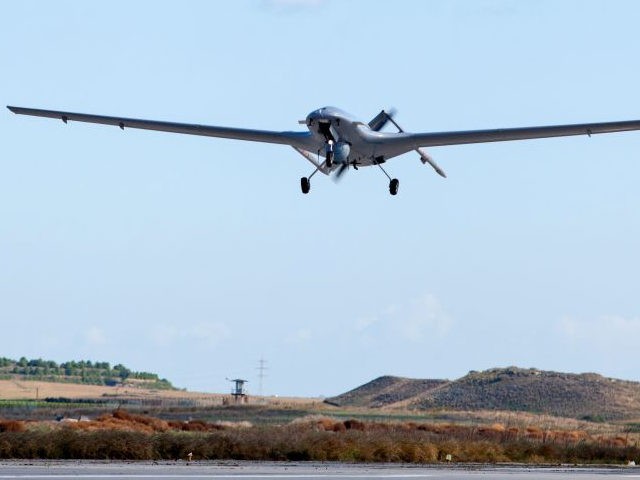The Pentagon confirmed on Thursday that American armed forces shot down a Turkish drone near Hasakah, northeast Syria, because it hovered over America’s base in the region and officers deemed it to be a “potential threat.”
Secretary of Defense Lloyd Austin said in a statement on Thursday that he held a conversation with his Turkish counterpart, Minister of National Defense Yasar Guler, in which both sides allegedly reiterated their “commitment to continue working together to defeat ISIS [the Islamic State] and ensure security and stability in the region.” The United States presently maintains a presence in Syria as part of its operations against the Islamic State, despite the fact that the ISIS “caliphate” headquartered in Raqqa, Syria, fell in 2017.
The Turkish military launched a new round of bombings in Syria and Iraq on October 1 in response to an alleged attempted suicide bombing in Ankara, the national capital, against the Turkish General Directorate of Security. One of the bombers reportedly detonated himself but did not succeed in causing any material damage or casualties. A branch of the Kurdistan Workers’ Party (PKK), a Marxist, U.S.-designated terrorist organization, took responsibility for the attack.
The government of Islamist Turkish President Recep Tayyip Erdogan claimed that the airstrikes in Iraq and Syria in response to the attack were intended to destroy PKK strongholds, supply depots, and other critical targets. The Turkish government considers the PKK indistinguishable from several other Kurdish groups active in Iraq and Syria, however, who have a history of cooperation with the United States in the struggle against ISIS, particularly the People’s Protection Units (YPG/YPJ) of Syrian Kurdistan, referred to by the Kurds as Rojava.
In an apparent attempt to target Kurdish groups in Syria, Turkish armed forces flew an unmanned aerial vehicle (UAV) too close to an American military outpost, the Pentagon explained on Thursday.
“At approximately 11:30 local time, a Turkish UAV re-entered the ROZ [American “restricted operating zone”] on a heading toward where U.S. forces were located,” Pentagon Press Secretary Air Force Brig. Gen. Pat Ryder told reporters during a briefing on Thursday. “U.S. commanders assessed that the UAV, which was now less than half a kilometer from U.S. forces, to be a potential threat, and U.S. F-16 fighters subsequently shot down the UAV in self-defense at approximately 11:40 local time.”
Ryder reportedly referred to the shootdown as “regrettable” and insisted American troops had “no indication that Turkey was intentionally targeting U.S. forces.”
“It’s a regrettable incident but U.S. commanders on the ground did assess that there was a potential threat, and so they took prudent action in this scenario,” Ryder said. “But again, the secretary has talked to his counterpart. They had the opportunity to have a fruitful conversation and again commit to one another that the U.S. and Turkey will continue to closely communicate and coordinate.”
I called Turkish Minister of National Defense Yasar Guler (@tcsavunma) today to discuss national security and defense-related matters of mutual interest. I reiterated U.S. commitment to continue working together to defeat ISIS and ensure security and stability in the region.…
— Secretary of Defense Lloyd J. Austin III (@SecDef) October 5, 2023
Ryder said that Austin used his conversation with Guler, the Turkish defense chief, to “reaffirm” that American troops are in Syria “exclusively” to combat the threat of the Islamic State, and not for any other operations. Austin also reportedly “acknowledged Turkey’s legitimate security concerns” regarding the PKK.
The Turkish government acknowledged the conversation between the defense chiefs. The coverage of the conversation in Turkey’s state-run Anadolu news agency did not mention the shootdown of the drone.
“Turkish National Defense Minister Yasar Guler and US Defense Secretary Lloyd Austin discussed collaboration, coordination and recent regional developments in a phone call Thursday,” Anadolu reported.
The Defense Ministry emphasized Guler’s alleged “readiness to collaborate with the US against ISIS/Daesh.”
“Both ministers emphasized the importance of close coordination between US and Turkish elements in activities conducted in the region,” it added.
Anadolu claimed that the airstrikes during which the U.S. military shot down a Turkish drone were a success, as they [Turkish forces] “destroyed a total of 30 targets including oil wells and storage facilities used by the PKK separatist terrorist organization and caves, bunkers, shelters and warehouses, which were considered to contain senior terrorists.”
During the operation carried out by Turkish National Intelligence Organization (MIT) in Syria, PKK/YPG weapons and ammunition warehouses were destroyed, along with terrorist attack and sabotage units and R&D centers ⤵︎ https://t.co/id1vpR1pzy pic.twitter.com/coFS5A3DSz
— Anadolu English (@anadoluagency) October 5, 2023
While the state news agency omitted mention of the destroyed drone, Yeni Safak, a pro-Erdogan newspaper, reported on the loss but claimed that it did not hurt Turkey’s ability to continue striking Syria. It cited the Turkish Foreign Ministry, which did not name the country that shot down the plane.
The Thursday bombings reportedly resulted in the deaths of nine people in Syrian Kurdistan, including civilians, the Kurdish news outlet Rudaw reported, citing Syrian Democratic Forces (SDF). The SDF is led by members of the Kurdish YPG/YPJ and has cooperated closely with American forces against the Islamic State.
“The Turkish state is committing a war crime by targeting the infrastructure and civic services facilities, including four power stations, three oil fields, and factories,” the head of the SDF media center Farhad Shami denounced following the attack. “The most heavily impacted by these aggressions are primarily innocent civilians.”
Local Kurdish groups also accused Turkey of targeting an area near a camp for civilians displaced by the Syrian Civil War and the Islamic State insurgency.

COMMENTS
Please let us know if you're having issues with commenting.